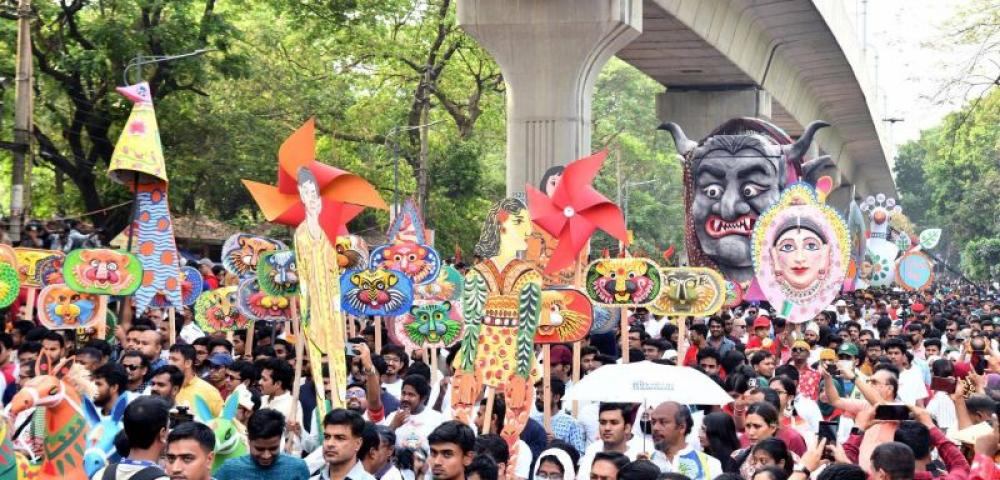Just Earth News | @justearthnews | 15 Apr 2025, 05:55 am Print
 Chittagong DC Hill
Chittagong DC Hill Poila Baisakh celebration in Bangladesh. Photo Courtesy: PID Bangladesh Facebook page
Organizers were forced to cancel the Poila Baisakh, or Bengali New Year, event in Chittagong's DC Hill region in Bangladesh after unidentified people destroyed the stage and banners, disrupting the preparations for the annual celebration.
According to reports, this was the first time Poila Baisakh was not celebrated in DC Hill region in the past 47 years.
Sucharit Das Khokon, the council’s coordinator, told bdnews24, "We organisers have decided not to go ahead with the programme following the attack."
“We won’t organise the programme. The attack and the administration’s lack of cooperation led us to this decision. We’ve informed the additional deputy commissioner (general) of our decision not to hold the event,” he added.
40 to 50 Youths Attacked
The stage was attacked and vandalised on Sunday when preparation for the celebration was underway.
Das claimed 40 to 50 youths attacked the stage.
“Monday morning was scheduled for the beginning of our celebration. We had completed all preparations, including the stage setup. Then, just before evening, 40 to 50 youths stormed the stage and launched an attack,” Sucharita Das Khokon told bdnews24.com.
The Sammilito Pohela Boishakh Udjapon Parishad organised the event for the past 46 years.
Five Detained And Then Released
Police detained and then released five people over the attack during the event.
Police told The Daily Star no formal complaint was lodged against the individuals, so they were released after filing of a General Diary (GD).
The detained people were identified as Md Alamgir, 42; Md Nizam Uddin, 42; Md Rafiqul Islam, 53; Md Shah Alam, 65; and Md Faruk, 42.
Multiple police sources confirmed to The Daily Star that the detainees identified themselves as BNP supporters.
The Bangladesh Nationalist Party (BNP) is a major political outfit in Bangladesh which has been ousted PM Sheikh Hasina's main opponent over the years.
According to reports, BNP leaders and activists gathered at the police station to ensure their detained supporters were released from prison.
Asked about their release, Md Abdul Karim, officer-in-charge of Kotwali Police Station, told The Daily Star, "Since no complaints were filed against them throughout the night, we released them based on the GD "
Bangladesh Celebrated Poila Baisakh
Bangladesh, the South Asian nation that witnessed a political change in 2024, celebrated New Year on Monday.
Former PM Sheikh Hasina was ousted from power on August 5, 2024 amid severe protests against her regime.
Following her exit, Nobel laureate Muhammad Yunus took charge of an interim government.
'Universal Festival For Bengalis'
In his video message, Yunus wished people on Bengali New Year and was quoted as saying by bdnews24: "Pohela Boishakh is a celebration of the heart, a universal festival of the Bengali people. Today is a day of joy and new beginnings for Bengalis across the world.”
Amid the rise of Islamic radicalism in the country, the 'Mongol Shobhajatra’ has been renamed as ‘Anondo Shobhajatra’.
The 'Mongol Shobhajatra' is an integral part of the Bengali New Year celebration in the South Asian country
Earlier this year, Islamic radical group Hefazat-e-Islam had described Mongol Shobhajatra a "Hindu ritual" and urged the government to change its name.
Issuing a statement, the group had further alleged that the Mongol Shobhajatra is "flooded with idols and imagery of Hindu deities and animals," which they argue is unacceptable in a secular setup.
"Secularists never object to this, but are quick to target Islamic symbols under the pretext of neutrality," the statement read.
UNESCO Recognition
UNESCO had recognised the 'Mongol Shobhajatra' as an 'Intangible Cultural Heritage of Humanity'.
Organized by students and teachers of Dhaka University’s Faculty of Fine Art in Bangladesh, the tradition aiming to promote inclusivity began in 1989.
- Former New Zealand PM Jacinda Ardern to relocate to Australia amid growing Kiwi exodus
- United Kingdom launches eVisa for Indian visitors starting today — Here’s what travellers need to know
- Abandoned at birth, Punch the macaque finds global love as crowds flock to Tokyo zoo
- YouTube Premium Lite just got a massive boost — Know all details
- Trump claims he stopped 35 million deaths by stopping India-Pakistan war





-1763561110.jpg)
